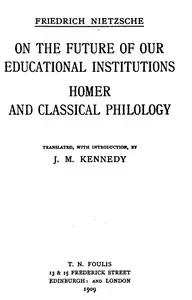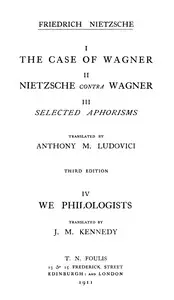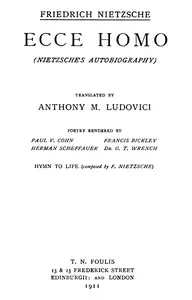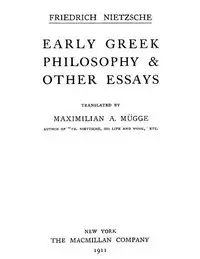"On the Future of Our Educational Institutions" by Friedrich Nietzsche is a series of philosophical lectures written in the late 19th century. The book addresses the state of educational institutions in Germany, critiquing them for prioritizing practicality and state service over genuine culture and the development of exceptional individual minds. Nietzsche proposes that true education should focus on cultivating genius and recognizing the importance of classical literature and art. The opening portion of the text provides a foundation for Nietzsche's philosophy on education, highlighting his concerns over the disconnect between current educational practices and the ideal of fostering true culture. He begins by expressing doubts about the efficacy of contemporary schools and denominations, suggesting that they fail to nurture creativity and intellectual rigor. Nietzsche reflects on his own educational experiences and those of his peers, emphasizing the necessity for schools to protect and cultivate the delicate minds of truly gifted individuals, as well as the need for a shift away from the prevailing utilitarian approaches to education. Through discussions with his audience, he sets the stage for a deeper exploration of these themes throughout the series of lectures. (This is an automatically generated summary.)

On the Future of our Educational Institutions; Homer and Classical Philology Complete Works, Volume Three
By Friedrich Wilhelm Nietzsche
"On the Future of Our Educational Institutions" by Friedrich Nietzsche is a series of philosophical lectures written in the late 19th century. The boo...
Friedrich Wilhelm Nietzsche was a German classical scholar, philosopher, and critic of culture, who became one of the most influential of all modern thinkers. He began his career as a classical philologist before turning to philosophy. He became the youngest person to hold the Chair of Classical Philology at the University of Basel in Switzerland in 1869, at the age of 24, but resigned in 1879 due to health problems that plagued him most of his life; he completed much of his core writing in the following decade. In 1889, at age 44, he suffered a collapse and afterward a complete loss of his mental faculties, with paralysis and probably vascular dementia. He lived his remaining years in the care of his mother until her death in 1897, and then with his sister Elisabeth Förster-Nietzsche. Nietzsche died in 1900, after experiencing pneumonia and multiple strokes.


















